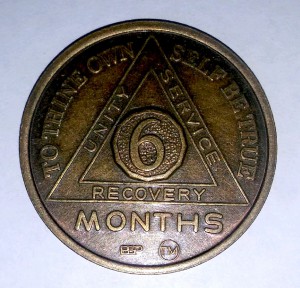A Buddhist Alcoholic Getting Sober in AA – a spiritual journey
 When I returned to Alcoholics Anonymous (AA) this year, I was a Buddhist. I took refuge in 2012 and my last AA meeting was in 2009. In 2011, I started drinking again. It took a few years to get back to AA. When I got back, I wanted to take The 12 Steps right away. However, I was worried that being a Buddhist might be an obstacle.
When I returned to Alcoholics Anonymous (AA) this year, I was a Buddhist. I took refuge in 2012 and my last AA meeting was in 2009. In 2011, I started drinking again. It took a few years to get back to AA. When I got back, I wanted to take The 12 Steps right away. However, I was worried that being a Buddhist might be an obstacle.
AA started in 1935. The founders were involved in the Oxford Group, before they created AA. The Oxford Group practiced first century Christianity. This is probably why the word God is used so much in AA. Also, there probably weren’t very many Buddhists in the United States back in 1935.
So what was I to do about AA’s emphasis on God? Buddhism is a nontheistic religion.
When I was on Step 2 (Came to believe that a Power greater than ourselves could restore us to sanity), my sponsor asked me where was I on the believing in a higher power spectrum. Did I have no problem believing that there was a power greater than myself? Was I an atheist? I said that I did not have a problem with believing there is a power greater than myself, but I’m a Buddhist. He said that there was no problem and I could have my own conception of a higher power. This was a relief. I didn’t have to believe someone else’s conception (e.g., an old man in the clouds controlling the universe). But I started to ponder what a Buddhist Shambhalian’s higher power would look like. Unconditional basic goodness? Buddha nature? The interconnectedness of the universe? Drala? The magic of reality, as it is? I opened my mind. I had a beginners mind. Shunryu Suzuki writes in Zen Mind, Beginner’s Mind, “In the beginner’s mind there are many possibilities, but in the expert’s there are few.” I did not know what this higher power was. I did not know what God was. My mind was open. In Chapter 4: We Agnostics from the Big Book of Alcoholics Anonymous, AA’s basic text, says, “We found that as soon as we were able to lay aside prejudice and express even a willingness to believe in a Power greater than ourselves, we commenced to get results, even though it was impossible for any of us to fully define or comprehend that Power, which is God.” For me, the word God is a signpost pointing me in the direction of this Power I can not fully define or comprehend.
Nowadays, there is a lot of interest in mindfulness and meditation. The world of addiction recovery and AA are also interested. I remember my sponsor wanted to check out our Shambhala center. I think one reason is Step 11. Step 11 is Sought through prayer and meditation to improve our conscious contact with God as we understood Him, praying only for knowledge of His will for us and the power to carry that out. The part that is in italics is very important. This is where AA says I can have my own conception of a higher power. In the Twelve Steps and Twelve Traditions, a book by AA, it is says, “The actual experience of meditation and prayer across the centuries is, of course, immense. The world’s libraries and places of worship are a treasure trove for all seekers. It is to be hoped that every A.A. who has a religious connection which emphasizes meditation will return to the practice of that devotion as never before.” The kind of meditation the founders of AA were talking about was probably reflective meditation. This would be similar to what we call contemplation. However, Buddhist meditation has become secular and a wide variety of individuals, including people in AA, have become interested in it. I think Shambhala, via Heart of Recovery (HoR), could help make meditation available to people in recovery. This is my vision.
I have volunteered to co-facilitate HoR in 2016 at the Portland Shambhala Meditation Center. I contacted other centers about their HoR programs, and found the way New York runs its program was interesting. They actually discuss the 12 Steps. In an email from New York, the facilitator of their HoR wrote, “12 steps are supported and the readings are generally focused around one of the 12 steps. This meeting is not an attempt to avoid the 12 steps, but generally more about differing ways of working with the 12 steps, recovery and meditation.” I’m hoping to use New York’s model for our HoR program here in Portland.
HoR could also be a place where Buddhists and Shambhalians in AA could go and talk about their difficulties with the word God or The 12 Steps. Here is a PDF from the San Francisco Zen Center titled 9 Essays: Buddhism and The 12 Step Model of Recovery. A lot of people in AA are not religious. One person shared at an AA meeting that her sponsor was an atheist, and nature was her higher power. The reason we take the 12 Steps is to have a spiritual experience or awakening. AA is a spiritual program, not a religious one. If a Buddhist alcoholic like me could have a spiritual experience in AA, then so could others.
— David Engelbrecht







